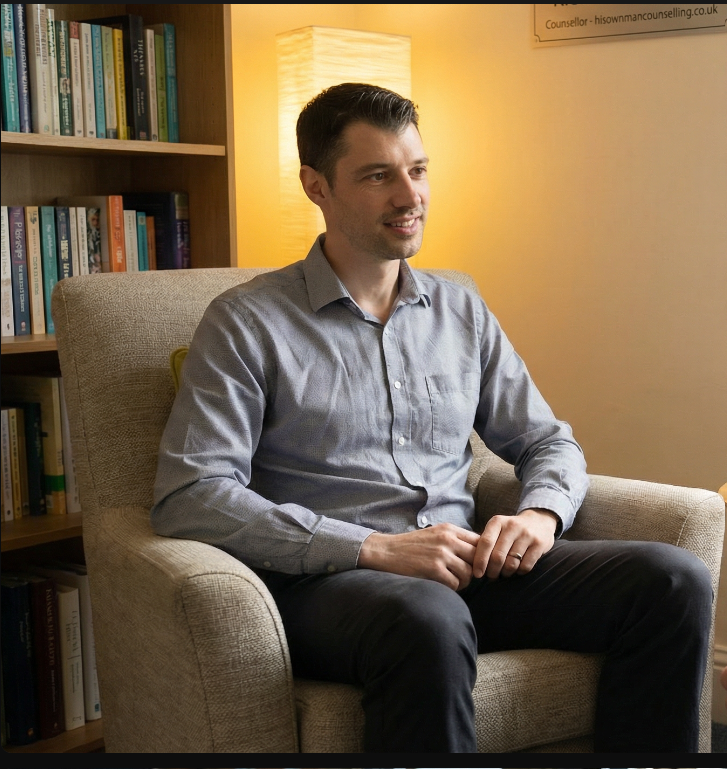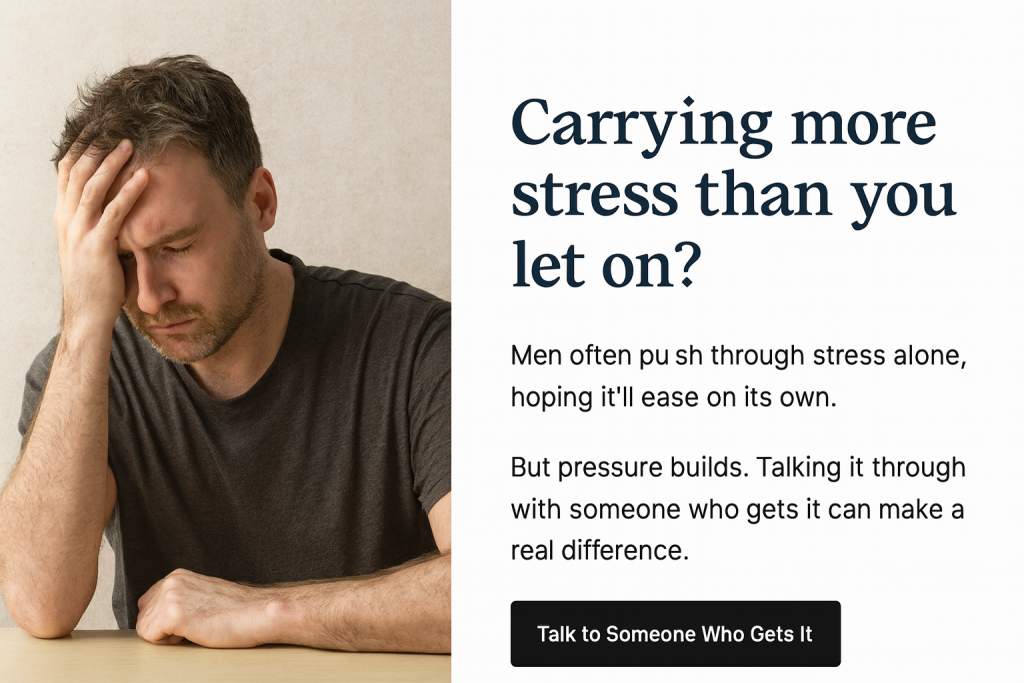A Calm, Practical Guide to Managing Stress & Anxiety in Wadebridge, Cornwall
By Kieran

Keywords: Wadebridge counsellor, Cornwall counselling, stress, anxiety, counselling for men, online counselling, private therapy, stress and anxiety support, counsellor in Wadebridge, counselling in Cornwall
The New Year has a habit of arriving with equal parts hope and heaviness. All across Wadebridge and Cornwall, people tell me they feel they “should” be starting fresh, feeling motivated, or finally getting life sorted. But instead, there’s a familiar mix of overwhelm, tension, and anxiety. As a Wadebridge counsellor offering stress and anxiety counselling in Wadebridge, I hear the same themes every January: racing thoughts, tight chests, irritability, exhaustion, and a sense of being stretched far too thin.
If you’re heading into the New Year feeling stressed or anxious, you’re not alone. This guide walks you through what stress and anxiety counselling looks like in my Wadebridge counselling practice and through online counselling across Cornwall. No pressure. No judgement. Just clear, grounded support.
A Warm Welcome and What to Expect in Counselling
Whether you come to see me for counselling in Wadebridge or join via online counselling, you’ll be met with a calm, friendly hello. You don’t need to have the right words. You don’t need to explain everything perfectly. You set the pace.
In your first stress and anxiety counselling session, I’ll outline what we’ll cover:
- a brief check on your wellbeing
- what’s been weighing on you
- how stress or anxiety shows up in your body
- what you want life to feel like instead
- a few practical tools you can start using today

If you’re joining through online counselling, we’ll check privacy, sound, and comfort. Many people in Cornwall prefer online sessions because they can talk openly from home, work, or even their car during a lunch break.
“You don’t have to see the whole staircase, just take the first step.”
Martin Luther King Jr.
Confidentiality, Always
Everything you share in counselling stays confidential. I’ll explain the rare legal limits around safety in plain English, but otherwise this is your space — not your employer’s, not your partner’s, not your insurer’s. Whether you’re coming for private therapy in Cornwall or online counselling, your privacy is respected.
You’re not judged. You’re not labelled. You’re heard.
Stress & Anxiety Are Signals, Not Failures
Many people seeking counselling in Cornwall believe stress or anxiety means they’re weak or failing. But stress and anxiety are signals — signs that something in your life needs attention.

In my work as a Wadebridge counsellor, I often see stress and anxiety linked to:
pressure at work
fear of letting people down
old coping patterns
exhaustion
feeling responsible for everyone else
uncertainty about the future
unresolved grief
loneliness or isolation
burnout from trying to hold everything together
When we treat anxiety as a signal — not a flaw — you can start to understand what it’s trying to tell you. Maybe you’re overloaded. Maybe you’re stretched too thin. Maybe you’ve been running on empty for too long. Stress and anxiety counselling helps you make sense of this.
Carrying more stress than you let on?
Men often push through stress alone, hoping it’ll ease on its own. But pressure builds. Talking it through with someone who gets it can make a real difference.
Talk to Someone Who Gets ItA Brief Assessment to Understand Your Stress & Anxiety
Why the New Year Triggers Stress & Anxiety
January brings a unique kind of pressure. As a counsellor in Wadebridge, I see the same patterns every year.
1. The pressure to “start fresh”
New Year’s resolutions can feel like demands rather than choices. You “should” be healthier, calmer, more productive. That pressure alone can create anxiety.
2. The comparison trap
Everyone online seems to be thriving. New routines. New goals. New achievements. It’s easy to feel behind.
3. The financial squeeze
After Christmas, many people in Cornwall feel the strain — especially with rising costs and family commitments.
4. The return to work
The shift from holiday mode to work mode can feel abrupt. The inbox, the deadlines, the expectations — it all hits at once.
5. The emotional hangover
The festive period can bring up loneliness, family tension, or grief. January often exposes what we’ve been avoiding.
This is where counselling in Wadebridge or online counselling can help you steady yourself.
How Long Are Counselling Sessions?
Standard counselling sessions are 50 minutes. If you book a single session or an urgent clarity session, we’ll use the full time to focus on what’s most pressing right now. Weekly counselling in Wadebridge or online helps you build steadiness week by week.
Consistency matters — especially when you’re trying to break old stress patterns.
Practical Tools You Can Use Today
You won’t leave with theory. You’ll leave with tools shaped around your life in Cornwall.
To calm your nervous system when anxiety spikes.
Box breathing, slow exhales, and paced breathing — discreet and effective.
To interrupt spirals before they take over.
Instead of trying to “fix” your thoughts, we explore what matters to you.
To reduce overwhelm without adding more pressure.
These tools are simple, discreet, and designed for real life — whether you’re at work, at home, or out walking along the Camel Trail trying to clear your head.
Click to explore stress and anxiety counselling
Common Stress & Anxiety Exercises in Counselling
In stress and anxiety counselling, we might explore:
urge surfing
the 5‑4‑3‑2‑1 grounding method
scheduling “pressure breaks”
journalling prompts
assertive communication
a traffic‑light plan for overwhelm
body‑based resets
reframing techniques
micro‑habits for daily calm
These are offered, not imposed. You choose what feels useful.
If you prefer to work from home, these tools fit easily into online counselling in Cornwall.

What Type of Counselling Works Best for Stress & Anxiety?
There’s no single “right” approach. Many people benefit from a person‑centred style — where the focus is on understanding your emotional landscape, not correcting your behaviour.
As a Wadebridge counsellor, I blend person‑centred counselling with practical tools, always tailored to your life here in Cornwall — not a manual.
“The beautiful thing about learning is that no one can take it away from you.”
B.B. King
If you prefer straightforward, grounded support, you can explore counselling for men or general Cornwall counselling services.
Your Options — Same Care Either Way
Weekly counselling in Wadebridge
Build insight and steadiness over time.
→ Learn more about counselling in Wadebridge
Online counselling across Cornwall
Flexible, confidential support from home or work.
→ Explore online counselling
Single session therapy
One focused session to map your situation and leave with a plan.
→ Single session therapy
Urgent clarity session
When stress peaks and you need calm today.
Feeling the pressure building beneath the surface?
Many men keep going, hoping the stress will settle on its own. But strain has a way of catching up. Opening up to someone who understands can take the weight off your shoulders.
Start a Conversation That HelpsWho Is This Counselling For?
Men and adults who want to feel calmer without shutting down
People who prefer straight‑talking support with warmth
Anyone feeling overwhelmed, tense, or stuck in their head
Cornwall locals wanting face‑to‑face counselling in Wadebridge
Those who need flexible online counselling
People who want practical tools, not lectures.
How We Get Started
Book your first appointment — in Wadebridge or online
Arrive a few minutes early or log in from a private space
We set goals, agree safety steps, and begin tools you can use straight away
“You miss 100% of the shots you don’t take.”
Wayne Gretzky
A Calm Next Step
Stress and anxiety don’t mean you’re weak. They mean you’ve been carrying too much, often for too long. With the right support, you can learn to steady your body, quiet your mind, and move into the New Year with clarity instead of pressure.
If you’re ready for a gentle, practical start, you can meet me for counselling in Wadebridge or through online counselling across Cornwall. No pressure — just clear, grounded support.
Ready to take the next step?
If stress, pressure, or overwhelm are starting to build, you don’t have to handle it alone. A conversation could be the turning point.
Get in Touch







